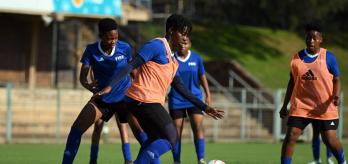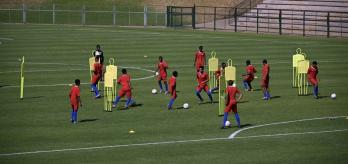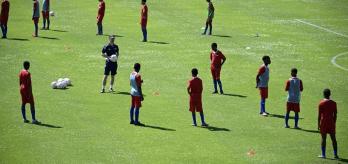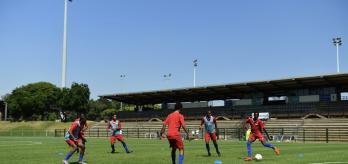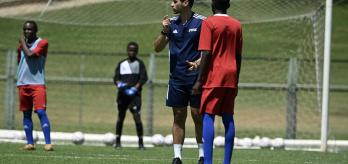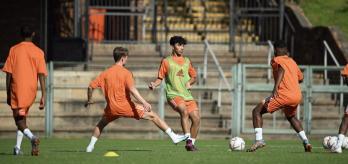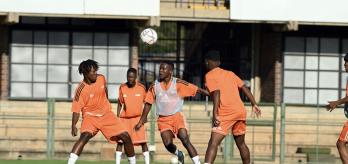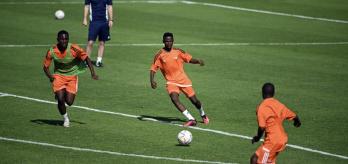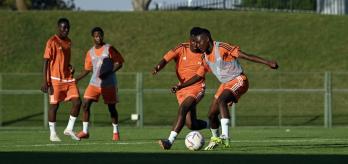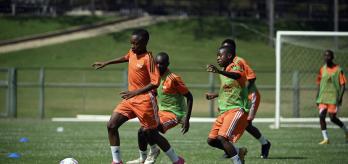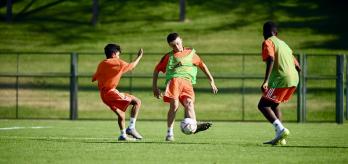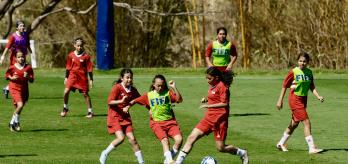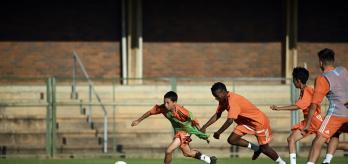Methodology
The intention: What is practised?
This possession-based exercise aims to improve a unit’s ability to build and progress play within a narrow focus. The drill focuses specifically on unit-level elements, such as positional adjustments and structure around the ball both in and out of possession. The unit’s shape should be based on the ball carrier’s position, with players tasked with creating angles and passing lanes. Depending on the opposition’s positioning and the available passing lanes, the unit must decide on the furthest and most comfortable pass that they can play, which is identified by looking forward as much as possible. Individual skills, such as adopting an open body posture and recognising spaces to step into, allow the unit to progress the ball forward. From a defensive perspective, defending players must decide on the most effective approach to pressing and whether to anticipate the pass played into deep areas and intercept or to step up and press the central player.
The scale: For whom is this relevant?
The exercise revolves around the unit and focuses on the positional structure to play through, around or over the press in the central channel. The drill is most relevant to players involved in breaking the opposition’s first line of press, such as the goalkeeper, centre-backs and deep-lying midfielders, when trying to play forward by finding either the number (8) or (10), who occupies a pocket of space between the lines. The centre-backs operate on the same lines as the opposition’s press and look to overcome it by combining with the goalkeeper, who is positioned outside the opposition’s shape, or a pivot player located behind the first line of press and may drop into the opposition’s shape. The number (8) waits in central areas and bases their movement on whether the number (6) has dropped or opened up a passing lane, while the number (10) waits behind the two pressing lines and tries to open a passing lane. The out-of-possession unit set up with 2 high-pressing players and cover players anticipating the progressive pass.
The practice type: How is the practice designed?
The exercise involves an opposed possession game and includes variable repetition that provides ample opportunities for a unit to practise offering to receive, movement to receive and passing forward to eliminate high-pressing opponents. The drill features a directional element, as the ball must reach the opposite end-zone player before it can be switched back. The channel is slightly wider than in the 3v3 plus 2 rondo to create a broader range of passing lanes and forward passes. The middle zone can be used as a focal point for midfielders to receive and connect, whilst also acting as a guide for covering defenders to position themselves when pressing. The exercise allows players to operate in several roles, for instance, pivot players can switch roles with centre-backs, who can become the number (8) or (10) when the ball is transferred to the opposite end of the exercise area.
Session plan
Organisation
-
Mark out a 30x15m exercise area and split it into thirds.
-
Divide the group into 3 teams: 4 oranges, 4 blues and 2 greens.
-
Arrange the players as follows: 2 green players at either end of the exercise area, 2 blues v. 2 oranges inside the first zone and 1 blue v. 1 orange inside both the middle zone and the third zone.
Explanation
-
The exercise starts with one of the green players in possession.
-
The green player plays the ball to one of the 2 orange players positioned inside the first zone.
-
The 2 blue players positioned in the first zone must press and try to win the ball. If they do so, possession switches and the teams swap roles.
-
The 2 orange players must combine and try to find one of their team-mates located in either the middle zone or the third zone or the green player positioned at the opposite end of the exercise area.
-
The blue players in the middle and end zones must try to block forward passes.
-
The orange player positioned in the middle zone can drop into the first zone, and the orange player located in the third zone can drop into the middle zone.
-
Once the ball is transferred to the green player at the opposite end of the exercise area, the players must move quickly towards the opposite end, restructure and contest the 2v2 in the first zone.
-
When the ball is in the opposite end zone, the green players can move freely inside the end zone.
Key coaching points
Roles of coaches
-
First coach: leads the exercise and intervenes at intervals to offer pointers.
-
Second coach: supports the first coach, with a particular focus on the defending team’s organisation.

























